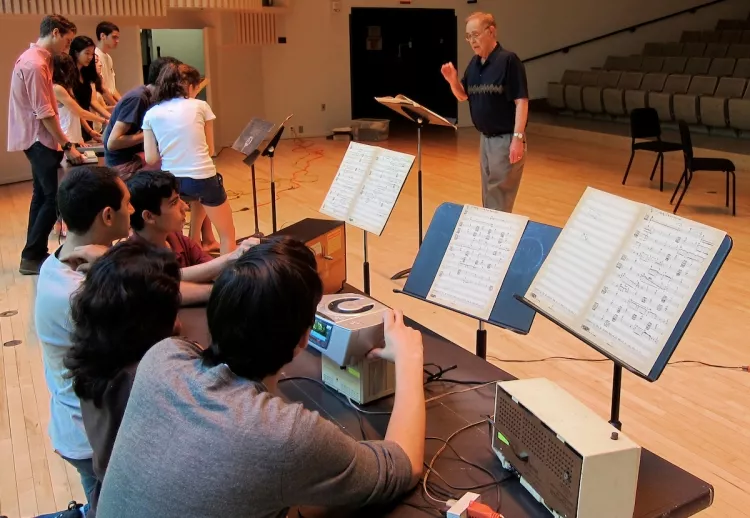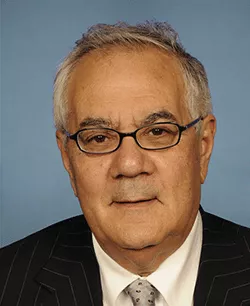Barney Frank to Visit Swarthmore for Performance, Dialogue

With artistic direction from James Freeman (right), Chamber Orchestra FIRST EDITIONS combines premieres of newly commissioned works by area performers with early Mozart works.
For the first — and, quite possibly, last — time, former Congressman Barney Frank will narrate a chamber orchestra performance on Friday at Swarthmore.
Without having rehearsed the show with Frank, the conductor, James Freeman, did not know what to expect. But he is confident in one thing: “It will be interesting.”
Of course, speaking in public and engaging an audience is nothing new to Frank, a stalwart in the House of Representatives and on LGBQT issues for decades. He will explore the political landscape with audience members before each performance, after meeting with College faculty and staff and visiting the American Politics class of Associate Professor and Department Chair of Political Science Keith Reeves '88.
For the performances premiering Friday, Frank will join Chamber Orchestra FIRST EDITIONS to narrate Gunther Schuller’s 1962 classic “Journey Into Jazz,” along with the Rittenhouse Jazz Quintet. The concert also features a Mozart concerto by Andrew Hauze ’04, lecturer in music; a world premiere from jazz drummer Gabriel Globus-Hoenich; and Symphony No. 29 (K.201), which Mozart wrote at the age of 18.
It’s something of a “personal memorial” for Freeman, a close friend of Schuller’s until the composer passed away last year. As the former president of the New England Conservatory, Schuller was a “true Bostonian,” Freeman says, “which got me thinking about who might appropriate as a narrator.”

Former Congressman Barney Frank will visit a political science class and engage the wider College community.
He zeroed in on Frank, with whom he attended Harvard but did not know, sending him an email last spring to gauge his interest. Frank responded the next day, saying he would love to do it.
Frank arrived on campus Wednesday for the first of three rehearsals with the musicians, a brief window in which to make him “more of an actor than he’s probably ever been,” says Freeman, Daniel Underhill Professor Emeritus of Music.
Steep learning curve or not, though, Frank figures to attract a wider audience than the orchestra typically does, Freeman says.
“With politics and LGBTQ issues so promiment in the conversation right now, I’m hoping he can bring a different dimension to these performances,” he says.
Leading programs for Orchestra 2001 and Chamber Orchestra FIRST EDITIONS, Freeman has brought several high-profile artists to campus, often with the support of the Cooper Foundation. But he has never involved a prominent non-musician in a concert.
“It was a very pleasant surprise that he was interested in us,” he says. “But he was, and is.”
More familiar to the College community, though, is how Chamber Orchestra FIRST EDITIONS combines premieres of newly commissioned works by area performers with early Mozart works. For the latter, Freeman tapped Hauze as soloist on major piano Concerto No. 12 (K.414), and Heidi Jacob, director of the Bryn Mawr-Haverford Orchestra, as conductor.
“It has been such a joy to work seriously on the concerto for the past six months or so,” Hauze says. “Mozart teaches me more every day, and practicing his music is a tremendously fulfilling and rich experience.
“These notes that can seem so straightforward on the page keep opening up new meanings, hidden corners and touching harmonies that to me are an endless source of wonder,” he adds. “I only hope that I can convey some of the beauty that I feel is in the piece to the audience!”
Hauze’s classmate at the Curtis Institute, Globus-Hoenich, will offer a counterpoint to Schuller’s piece, in harmony with the orchestra and jazz quintet.
“That’s sort of the basis of what we do,” Freeman says, “combining things that may seem totally distinct from one another but that make sense together.”
“Gosh, I’m looking forward to everything on this program.”
Performances will be held Friday, Oct. 6, at 8 p.m. in the Lang Concert Hall; Saturday, Oct. 7 at 3 p.m. in Roberts Hall, Marshall Auditorium at Haverford College; and Sunday, Oct. 8 at 3 p.m. at the Perelman Theater, Kimmel Center for the Performing Arts. The first two performances are free and open to the public without a ticket, and tickets for the third can be purchased here. All performances will be preceded by 30 minutes of on-stage discussion with Congressman Frank.



